Perspectives of traditional Chinese medicine to patch up immune checkpoint blockers
In this era of cancer immunotherapy, the response rates of immune checkpoint blockers (ICBs) are still too low and the adverse events may also be significant. Of the ways of patching up such deficit
[...] Read more.
In this era of cancer immunotherapy, the response rates of immune checkpoint blockers (ICBs) are still too low and the adverse events may also be significant. Of the ways of patching up such deficits, chemotherapy (ChT), especially if metronomic, seems promising, especially as immunity induced by immunogenic cell death (ICD) may be preserved. However, side effects, e.g., lymphocytopenia and interstitial pneumonitis cannot be ignored; eventually, resistance may also ensue. Vascular endothelial growth factors (VEGFs), being potent angiogenic factors, promote cancer cells’ purposeful angiogenesis rendering an extremely resistant tumor microenvironment (TME). This highly evasive and extremely resilient TME actually demands multi-agent, multi-target agents as currently in use through traditional Chinese medicine (TCM). With a good track record of 3,000 years, TCM is favored by mainland Chinese cancer patients. Although TCM had been criticized as unscientific and imprecise, recently, artificial intelligence (AI) technologies serve to elucidate the sound scientific basis and validity of TCM. Several TCM preparations having anti-VEGF actions are found; others suppress immune checkpoints. Especially, these herbs’ multi-prong approach appears to be more effective than Western medicine’s primarily monotherapy approach if one wishes to eradicate the very resistant TME. A “bonus” point is that some autoimmune-related adverse side effects of ICBs may also be reduced by TCM. Nevertheless, as the TCM experience is mostly anecdotal, robust clinical trials are mandatory. Moreover, other TCM problems, e.g., herbal batch variations and consistency and uniformity of herbal prescriptions are outstanding. Invariably, TCM prescriptions have daily variations as the practice of “syndrome differentiation” is hailed. Despite experienced TCM practitioners would refuse to give up their time-honored traditional practice, the multi-prong approach is still very attractive for the undue resilience of TME, let alone its good safety profile, ready availability, and eminent affordability. Although the passage is dark, light is now appearing at the end of the tunnel.
Shiu Ying Tsao
In this era of cancer immunotherapy, the response rates of immune checkpoint blockers (ICBs) are still too low and the adverse events may also be significant. Of the ways of patching up such deficits, chemotherapy (ChT), especially if metronomic, seems promising, especially as immunity induced by immunogenic cell death (ICD) may be preserved. However, side effects, e.g., lymphocytopenia and interstitial pneumonitis cannot be ignored; eventually, resistance may also ensue. Vascular endothelial growth factors (VEGFs), being potent angiogenic factors, promote cancer cells’ purposeful angiogenesis rendering an extremely resistant tumor microenvironment (TME). This highly evasive and extremely resilient TME actually demands multi-agent, multi-target agents as currently in use through traditional Chinese medicine (TCM). With a good track record of 3,000 years, TCM is favored by mainland Chinese cancer patients. Although TCM had been criticized as unscientific and imprecise, recently, artificial intelligence (AI) technologies serve to elucidate the sound scientific basis and validity of TCM. Several TCM preparations having anti-VEGF actions are found; others suppress immune checkpoints. Especially, these herbs’ multi-prong approach appears to be more effective than Western medicine’s primarily monotherapy approach if one wishes to eradicate the very resistant TME. A “bonus” point is that some autoimmune-related adverse side effects of ICBs may also be reduced by TCM. Nevertheless, as the TCM experience is mostly anecdotal, robust clinical trials are mandatory. Moreover, other TCM problems, e.g., herbal batch variations and consistency and uniformity of herbal prescriptions are outstanding. Invariably, TCM prescriptions have daily variations as the practice of “syndrome differentiation” is hailed. Despite experienced TCM practitioners would refuse to give up their time-honored traditional practice, the multi-prong approach is still very attractive for the undue resilience of TME, let alone its good safety profile, ready availability, and eminent affordability. Although the passage is dark, light is now appearing at the end of the tunnel.
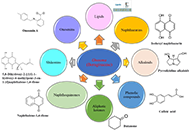 Onosma L. as a source of anticancer agents: phytochemistry to mechanistic insightOpen AccessReviewOnosma (O.) is a genus of perennial flowering plants in the family Boraginaceae with approximately 250 species widely dispersed in temperate, tropical, and subtropical areas. It is traditionally use [...] Read more.Ajay Kumar ... Satwinderjeet KaurPublished: October 31, 2022 Explor Target Antitumor Ther. 2022;3:719–733
Onosma L. as a source of anticancer agents: phytochemistry to mechanistic insightOpen AccessReviewOnosma (O.) is a genus of perennial flowering plants in the family Boraginaceae with approximately 250 species widely dispersed in temperate, tropical, and subtropical areas. It is traditionally use [...] Read more.Ajay Kumar ... Satwinderjeet KaurPublished: October 31, 2022 Explor Target Antitumor Ther. 2022;3:719–733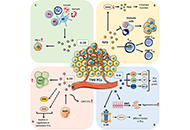 The tumor innate immune microenvironment in prostate cancer: an overview of soluble factors and cellular effectorsOpen AccessReviewProstate cancer (PCa) accounts as the most common non-cutaneous disease affecting males, and as the first cancer, for incidence, in male. With the introduction of the concept of immunoscore, PCa has [...] Read more.Maria Teresa Palano ... Lorenzo MortaraPublished: October 31, 2022 Explor Target Antitumor Ther. 2022;3:694–718
The tumor innate immune microenvironment in prostate cancer: an overview of soluble factors and cellular effectorsOpen AccessReviewProstate cancer (PCa) accounts as the most common non-cutaneous disease affecting males, and as the first cancer, for incidence, in male. With the introduction of the concept of immunoscore, PCa has [...] Read more.Maria Teresa Palano ... Lorenzo MortaraPublished: October 31, 2022 Explor Target Antitumor Ther. 2022;3:694–718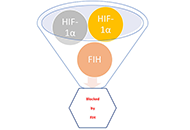 Perspectives of traditional Chinese medicine to patch up immune checkpoint blockersOpen AccessReviewIn this era of cancer immunotherapy, the response rates of immune checkpoint blockers (ICBs) are still too low and the adverse events may also be significant. Of the ways of patching up such deficit [...] Read more.Shiu Ying TsaoPublished: October 31, 2022 Explor Target Antitumor Ther. 2022;3:676–693
Perspectives of traditional Chinese medicine to patch up immune checkpoint blockersOpen AccessReviewIn this era of cancer immunotherapy, the response rates of immune checkpoint blockers (ICBs) are still too low and the adverse events may also be significant. Of the ways of patching up such deficit [...] Read more.Shiu Ying TsaoPublished: October 31, 2022 Explor Target Antitumor Ther. 2022;3:676–693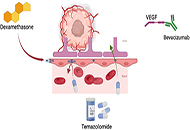 Steroid utility, immunotherapy, and brain tumor management: an update on conflicting therapiesOpen AccessReviewSteroid use is a widely accepted practice for both the treatment and prevention of tumor-induced edema, but there are many unknowns regarding their current clinical utility with modern anti-tumor th [...] Read more.Matthew Goldman ... Stephan QuintinPublished: October 31, 2022 Explor Target Antitumor Ther. 2022;3:659–675
Steroid utility, immunotherapy, and brain tumor management: an update on conflicting therapiesOpen AccessReviewSteroid use is a widely accepted practice for both the treatment and prevention of tumor-induced edema, but there are many unknowns regarding their current clinical utility with modern anti-tumor th [...] Read more.Matthew Goldman ... Stephan QuintinPublished: October 31, 2022 Explor Target Antitumor Ther. 2022;3:659–675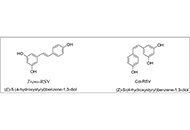 Potential role of resveratrol and its nano-formulation as anti-cancer agentOpen AccessReviewThe uncontrolled and metastatic nature of cancer makes it worse and more unpredictable. Hence, many therapy and medication are used to control and treat cancer. However, apart from this, many medica [...] Read more.Akshay Kumar ... Dilpreet SinghPublished: October 31, 2022 Explor Target Antitumor Ther. 2022;3:643–658
Potential role of resveratrol and its nano-formulation as anti-cancer agentOpen AccessReviewThe uncontrolled and metastatic nature of cancer makes it worse and more unpredictable. Hence, many therapy and medication are used to control and treat cancer. However, apart from this, many medica [...] Read more.Akshay Kumar ... Dilpreet SinghPublished: October 31, 2022 Explor Target Antitumor Ther. 2022;3:643–658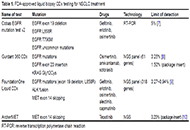 Clinical utility of liquid biopsy-based companion diagnostics in the non-small-cell lung cancer treatmentOpen AccessReviewRecently, technological advances in the detection and biological characterization of circulating tumor DNA (ctDNA) have enabled the implementation of liquid biopsy testing into clinical practice. Me [...] Read more.Yoshiharu SatoPublished: October 31, 2022 Explor Target Antitumor Ther. 2022;3:630–642
Clinical utility of liquid biopsy-based companion diagnostics in the non-small-cell lung cancer treatmentOpen AccessReviewRecently, technological advances in the detection and biological characterization of circulating tumor DNA (ctDNA) have enabled the implementation of liquid biopsy testing into clinical practice. Me [...] Read more.Yoshiharu SatoPublished: October 31, 2022 Explor Target Antitumor Ther. 2022;3:630–642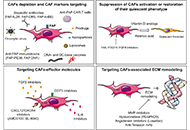 Modulation of the antitumor immune response by cancer-associated fibroblasts: mechanisms and targeting strategies to hamper their immunosuppressive functionsOpen AccessReviewCancer-associated fibroblasts (CAFs) are highly heterogeneous players that shape the tumor microenvironment and influence tumor progression, metastasis formation, and response to conventional therap [...] Read more.Jerome ThieryPublished: October 27, 2022 Explor Target Antitumor Ther. 2022;3:598–629
Modulation of the antitumor immune response by cancer-associated fibroblasts: mechanisms and targeting strategies to hamper their immunosuppressive functionsOpen AccessReviewCancer-associated fibroblasts (CAFs) are highly heterogeneous players that shape the tumor microenvironment and influence tumor progression, metastasis formation, and response to conventional therap [...] Read more.Jerome ThieryPublished: October 27, 2022 Explor Target Antitumor Ther. 2022;3:598–629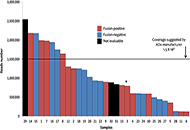 Targeted RNA-sequencing analysis for fusion transcripts detection in tumor diagnostics: assessment of bioinformatic tools reliability in FFPE samplesOpen AccessOriginal ArticleAim: Diagnostic laboratories are progressively introducing next-generation sequencing (NGS) technologies in the routine workflow to meet the increasing clinical need for comprehensive molecular c [...] Read more.Iolanda Capone ... Giancarlo PruneriPublished: October 27, 2022 Explor Target Antitumor Ther. 2022;3:582–597
Targeted RNA-sequencing analysis for fusion transcripts detection in tumor diagnostics: assessment of bioinformatic tools reliability in FFPE samplesOpen AccessOriginal ArticleAim: Diagnostic laboratories are progressively introducing next-generation sequencing (NGS) technologies in the routine workflow to meet the increasing clinical need for comprehensive molecular c [...] Read more.Iolanda Capone ... Giancarlo PruneriPublished: October 27, 2022 Explor Target Antitumor Ther. 2022;3:582–597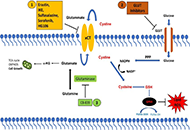 A xCT role in tumour-associated ferroptosis shed light on novel therapeutic optionsOpen AccessCommentarySolute carrier family 7 member 11 (SLC7A11; also known as xCT), a key component of the cystine/glutamate antiporter, is essential for the maintenance of cellular redox status and the regulation of t [...] Read more.Daniela Criscuolo ... Angela CelettiPublished: October 25, 2022 Explor Target Antitumor Ther. 2022;3:570–581
A xCT role in tumour-associated ferroptosis shed light on novel therapeutic optionsOpen AccessCommentarySolute carrier family 7 member 11 (SLC7A11; also known as xCT), a key component of the cystine/glutamate antiporter, is essential for the maintenance of cellular redox status and the regulation of t [...] Read more.Daniela Criscuolo ... Angela CelettiPublished: October 25, 2022 Explor Target Antitumor Ther. 2022;3:570–581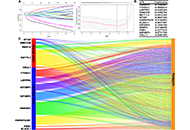 N6-methyladenosine-related microRNAs risk model trumps the isocitrate dehydrogenase mutation status as a predictive biomarker for the prognosis and immunotherapy in lower grade gliomasOpen AccessOriginal ArticleAim: Lower grade gliomas [LGGs; World Health Organization (WHO) grades 2 and 3], owing to the heterogeneity of their clinical behavior, present a therapeutic challenge to [...] Read more.Feng Yuan ... Chiyuan MaPublished: September 30, 2022 Explor Target Antitumor Ther. 2022;3:553–569
N6-methyladenosine-related microRNAs risk model trumps the isocitrate dehydrogenase mutation status as a predictive biomarker for the prognosis and immunotherapy in lower grade gliomasOpen AccessOriginal ArticleAim: Lower grade gliomas [LGGs; World Health Organization (WHO) grades 2 and 3], owing to the heterogeneity of their clinical behavior, present a therapeutic challenge to [...] Read more.Feng Yuan ... Chiyuan MaPublished: September 30, 2022 Explor Target Antitumor Ther. 2022;3:553–569